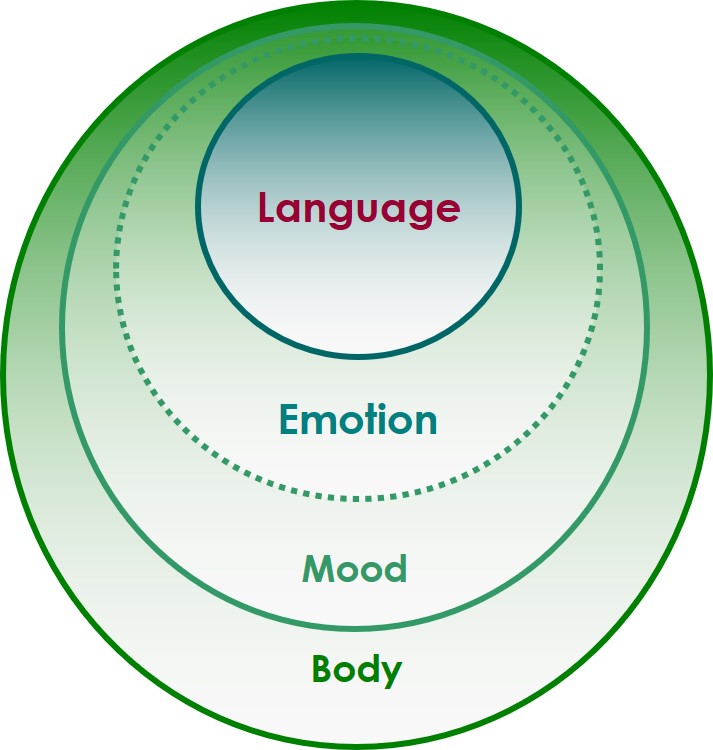
If we are to effectively explore the human condition, we need a means of distinguishing that condition in a way that allows for deeper understanding whilst retaining a sense of the whole.
In this approach, we consider the human condition as a coherence of three domains – physical being (body), emotional being (moods and emotions) and linguistic being (language).
Rather than these domains being seen just as a set of lenses into the human condition, they are defined as a ‘hierarchy of predispositions’. The idea is the lower level of the hierarchy creates the conditions where higher levels tend to produce certain states or dynamics. Our physical being (body) sits at the bottom of the hierarchy and supports all the other domains. Think of it this way. Without a body, there is no emotion, no language, no experience at all. Without a body, you do not exist.
Our physical being embraces all aspects of our physical structure, the dynamics of our structure and the energy levels and flow through our structure. It holds all our memories, formed by our previous experiences. Our current physical being also holds all our possible ways of engaging with the world at this moment. The implication is that our physical being holds all our predispositions for action.

Our emotional being consists of our moods and emotions. Humans have a generalised body experience of internal sensations known as ‘affect’. Affect is broken into two aspects, valence and arousal where valence is a scale of pleasantness and arousal is a scale of excitement. Our moods are reflections of our habitual stances to and ways of engaging the world and provide an ever-present sense of feeling, meaning we can always be said to be in a mood.
Affect reflects the current state of balance of our physical structure, dynamics and energy level and flow and so our physical being predisposes our mood. As such, awareness of our mood provides a feedback loop about our current stance to the world and how we are generally predisposed to act.
Consider this example. You wake up in the morning after a good night’s sleep, feeling well rested and energetic. How are you likely to feel within yourself and about the day ahead? What about the alternative. After a late night of over-indulgence and broken sleep, you wake up feeling rather unpleasant and low in energy. Now how do you feel within yourself and about the day ahead? No doubt some of how you feel stems from your general worldview. If you generally see the world as a threatening place, then chances are you will still see threat no matter how well energised and rested you are. Having said that, if you are always expecting threat then chances are you will never feel particularly well rested. After all, constant threat requires constant vigilance.
We take our mood into the day and engage with life from the context of that mood. Let’s take the first mood state from the last paragraph. You feel energised and you are looking forward to the day. You head to the kitchen for breakfast and find your two teenage children having an argument. How do you react? Now put yourself in the same situation but in the context of the second mood where you feel unpleasant and lacking in energy.
Chances are you will find yourself in a different emotional state as you deal with your arguing offspring. In other words, our mood state predisposes our emotional states in any given situation. The key here is predisposition. A predisposition is not a direct cause and effect, merely a tendency towards something. We can be poorly rested and still find ourselves in a constructive mood. We can be well rested and still find ourselves in a defensive mood. The key is they will just be less likely.
Our emotional states provide a feedback loop that feeds into our interpretation of what is happening and establishes a predisposition for your linguistic being encompassing different thought processes, conversations, and ultimately actions.
This hierarchy of predispositions is every present and the state of our being at a given point in time will establish predispositions for the actions we will take. Our physical being will predispose our emotional being which in turn will predispose our linguistic being.
Through our internal sensations, our physical and emotional being provide feedback loops regarding our predispositions. Human beings are largely habitual in nature, so without any intervention, those predispositions will simply play out as our actions. However, human beings are gifted with a capacity for complex language. Through language, we can develop an understanding of all aspects of our being. We can create meaning in those feedback loops and make decisions about what action to take. We do not have to be a slave to our predispositions.
Yet, we can use language for more than just intervention in response to our internal feedback loops. We can use it to seek to create new habitual predispositions. Our cascade of predispositions speaks to the habitual nature of the human condition. Habits born of a lifetime of experiences that have shaped our physical, emotional, and linguistic being and then perpetuate how we live.
Through language, we can design new recurrent experiences and create the possibility of new ways of being. This idea lies at the heart of this work and will be a recurrent theme.